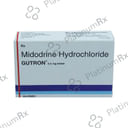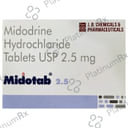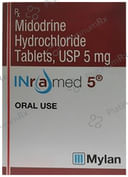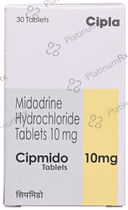Midodrine
Uses
Midodrine is used in the treatment of low blood pressure.
How it Works
How Midodrine works Midodrine is an alpha-adrenergic agonist. It functions by activating specific receptors on blood vessels, leading to their constriction and an increase in blood pressure.
Side Effects
Common side effects of Midodrine include nausea, piloerection, supine hypertension, discomfort when urinating, stomatitis (inflammation of the mouth), dyspepsia, urinary retention, and itching.
Expert Advice
- Take Midodrine at least 4 hours before bedtime to avoid the risk of high blood pressure at night.
- Monitor your blood pressure regularly while taking this medication.
- Inform your doctor if you have a history of prostate disorders or blood circulation problems.
- Notify your doctor immediately if you experience symptoms such as chest pain, palpitations, headache, shortness of breath, or blurred vision.
- Inform your doctor if you are pregnant, planning to become pregnant, or breastfeeding.
Related Medications
Midodrine 5mg

₹666

₹344.5
MRP ₹703.1
Midodrine 2.5mg

₹273.5

₹208.8
MRP ₹464
Midodrine 2.5mg

₹980

₹208.8
MRP ₹464
Midodrine 5mg

₹344.5
MRP ₹703.1
Midodrine 2.5mg

₹1,028.4

₹208.8
MRP ₹464
Midodrine 2.5mg

₹2,541

₹208.8
MRP ₹464
Midodrine 2.5mg

₹200

₹208.8
MRP ₹464
Midodrine 2.5mg

₹1,364.1

₹208.8
MRP ₹464
Midodrine 2.5mg

₹1,234.7

₹208.8
MRP ₹464
Midodrine 2.5mg

₹422

₹208.8
MRP ₹464
Midodrine 2.5mg

₹872.3

₹208.8
MRP ₹464
Midodrine 5mg

₹1,455

₹344.5
MRP ₹703.1
Midodrine 5mg

₹12,000

₹344.5
MRP ₹703.1
Midodrine 5mg

₹515.6

₹344.5
MRP ₹703.1
Midodrine 5mg

₹825

₹344.5
MRP ₹703.1
Midodrine 5mg

₹800

₹344.5
MRP ₹703.1
Midodrine 5mg

₹703.1

₹344.5
MRP ₹703.1
Midodrine 5mg

₹898

₹344.5
MRP ₹703.1
Midodrine 5mg

₹850

₹344.5
MRP ₹703.1
Midodrine 2.5mg

₹890.6

₹208.8
MRP ₹464
Midodrine 2.5mg

₹547

₹208.8
MRP ₹464
Midodrine 2.5mg

₹990

₹208.8
MRP ₹464
Midodrine 10mg

₹1,203.1

₹515.6
MRP ₹1,031.3
Midodrine 2.5mg

₹695

₹208.8
MRP ₹464
Midodrine 5mg

₹686.3

₹344.5
MRP ₹703.1
Flat ₹100 off on first app order | Use Code: APP100 |
Flat ₹100 off on first app order
USE CODE: APP100

Download Now